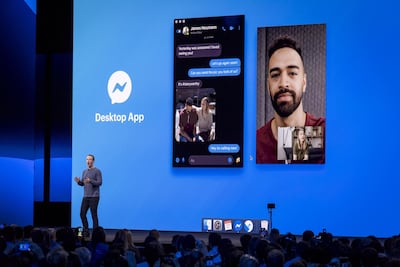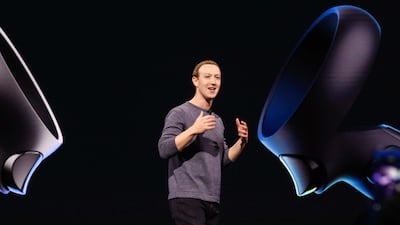Mark Zuckerberg, the founder and chief of Facebook, broke into a fit of laughter as he announced a roadmap to a privacy overhaul at its annual developer conference, F8, in San Jose on Tuesday.
“Look, I get that a lot of people aren’t sure that we’re serious about this,” Mr Zuckerberg said. “I know that we don’t exactly have the strongest reputation on privacy right now, to put it lightly. But I’m committed to doing this well.”
Mr Zuckerberg showed himself to be aware of the challenge Facebook will face to be taken seriously by privacy experts, after years of scandal over data misuse and data breaches.
The company’s new “privacy-focused social platform” promises an overhaul of Facebook’s core products that will lead to the integration of WhatsApp, Messenger and Instagram messages into a single product with end-to-end encryption.
“The future is private,” Mr Zuckerberg said.
The details of the plan, which was announced in March, are now emerging. Messenger has been rewritten from scratch, Mr Zuckerberg said. It will include new mobile and desktop apps and a “friends” tab that brings Instagram stories and Facebook posts into the app.
Facebook will lose its iconic blue logo and have an entire new webpage before the end of the year.
Much emphasis has been put on the ability to carry out secure financial transactions. The company is expected to move away from its current source of revenues – harvesting data for targeted advertising – and towards e-commerce and payments.
“I believe it should be as easy to send money to someone as it should be to send a photo,” Mr Zuckerberg said.
WhatsApp is piloting a payments product in India, while Instagram is launching a new “Shopping” panel in its “explore” section and a pilot program to allow users to buy products directly from influencer posts.
Portal, the smart screen for video chatting launched last fall, will be available internationally later this year and will support WhatsApp calls in addition to Messenger.

Facebook Dating will be expanded into 14 new markets, including places in where Facebook has high user growth. The "Secret Crush" feature will allows users to explore potential romantic relationships within their friend circle.
New shopping and other business-to-consumer interactions, already popular in Chinese social apps like WeChat, could also help squeeze revenue out of Facebook's messaging services.
Facebook has been criticised for the way it defines privacy, which differs from the way advocates do. Facebook has generally focused on limiting the amount of information that the public or a government can access about an individual, while privacy experts have pushed for the platform to limit the amount of information that it collects and retains about its users. End-to-end encryption will prevent Facebook from collecting data on the content of its users’ messages, but the company did not specify whether it will limit its collection of data about users on other fronts.



